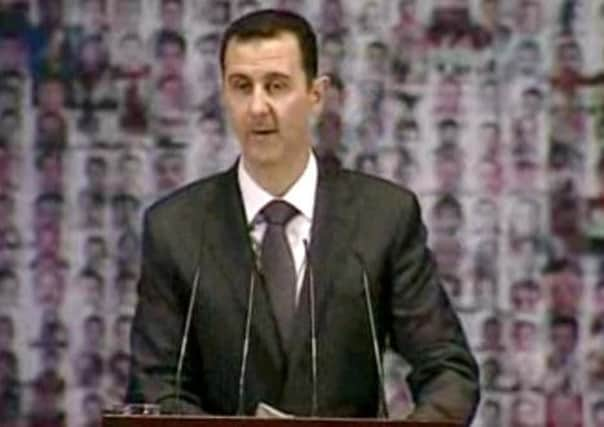G8 Summit: Warning over arming Syria rebels


The embattled leader said arming his opponents would lead to an increase in terrorist insurgency in Europe’s backyard, as a new poll showed a majority of Britons are against providing arms for the rebels – and fear it could lead to reprisals against the UK.
The conflict overshadowed the gathering of G8 world leaders in Northern Ireland yesterday, with US president Barack Obama having pledged to arm the rebels, while Russia’s Vladimir Putin is providing the Assad regime with firepower.
Advertisement
Hide AdAdvertisement
Hide AdPrime Minister David Cameron admitted he was as “worried as anyone” about the prospect of rebel forces being driven by al-Qaeda extremists, but indicated that the UK might be poised to intervene.
His remarks came as the American and European leaders announced a £100 billion trade deal had moved a step closer, with formal negotiations to get under way in the United States next month. The annual G8 summit – which brings together the leaders of the UK, the US, France, Germany, Italy, Canada, Japan and Russia – was taking place behind tight security, with 8,000 police around the venue.
The dramatic gulf between Russia and the West over Syria has been laid bare in recent days, with Mr Putin warning the international community against arming militants who “eat the organs” of their enemies.
Mr Cameron insisted it was right to engage with the Syrian crisis and seek to put pressure on both sides to attend peace talks to discuss a transitional government for the country.
There have been growing concerns that the Syrian opposition is driven by extremist al-Qaeda factions. Mr Assad said in an interview with a German newspaper yesterday that arming them would result in an export of terrorism to Europe.
“If the Europeans deliver weapons, the backyard of Europe will become terrorist and Europe will pay the price for it,” the Syria president said.
“Terrorists will gain experience in combat and return with extremist ideologies.”
The comments were Mr Assad’s first since the US announced it would be supplying military aid to rebel fighters.
Advertisement
Hide AdAdvertisement
Hide AdHe also denied claims that his forces had used chemical weapons against his people during the escalating conflict.
“If Paris, London and Washington had any evidence for their claims, they would have submitted it to the global public,” he said.
A new ComRes poll, meanwhile, reveals that just 17 per cent of the British population would support the British government providing arms to the Syrian rebels, while 53 per cent oppose the idea.
There is concern that there would be serious consequences from arming the rebels. More than half (56 per cent) believe the government should not arm them, because of the risk that the weapons will fall into the hands of terrorists, while the same proportion worry that arming the rebels would increase the risk of terrorist attacks aimed at Britain.
But Foreign Secretary William Hague said Britain must protect the Syrian opposition from being “exterminated”, warning that the crisis was “on a trajectory to get worse”.
Mr Cameron said yesterday: “I am as worried as anybody else about elements of the Syrian opposition, who are extremists, who support terrorism and who are a great danger to our world.
“The question is, what do we do about it? My argument is that we shouldn’t accept that the only alternative to Assad is terrorism and violence.
“We should be on the side of Syrians who want a democratic and peaceful future for their country and one without the man who is using chemical weapons against them.”
Advertisement
Hide AdAdvertisement
Hide AdWhile acknowledging the “big differences” between the West and Moscow, Mr Cameron insisted: “We all see the need for a peace conference, a peace process and a transition to a different regime in Syria. There is some common ground there and that’s what we should work on here at the G8.”
Mr Hague said Iran had opportunities to play a constructive role in ending the violence in Syria, despite evidence showing it was participating in murder, torture and abuse.
Mr Hague told the Commons: “We are a very long way as things stand today from Iran instead playing a helpful, diplomatic, restraining role, highly desirable though that would be.”
The number of Syrian refugees could reach 3.5 million by the end of the year if no progress was made on a peace process, said European Council president Herman van Rompuy, adding: “That perspective certainly creates a heavy burden on the shoulders of our leaders.”
MORE ON G8
MORE ON SYRIA
•